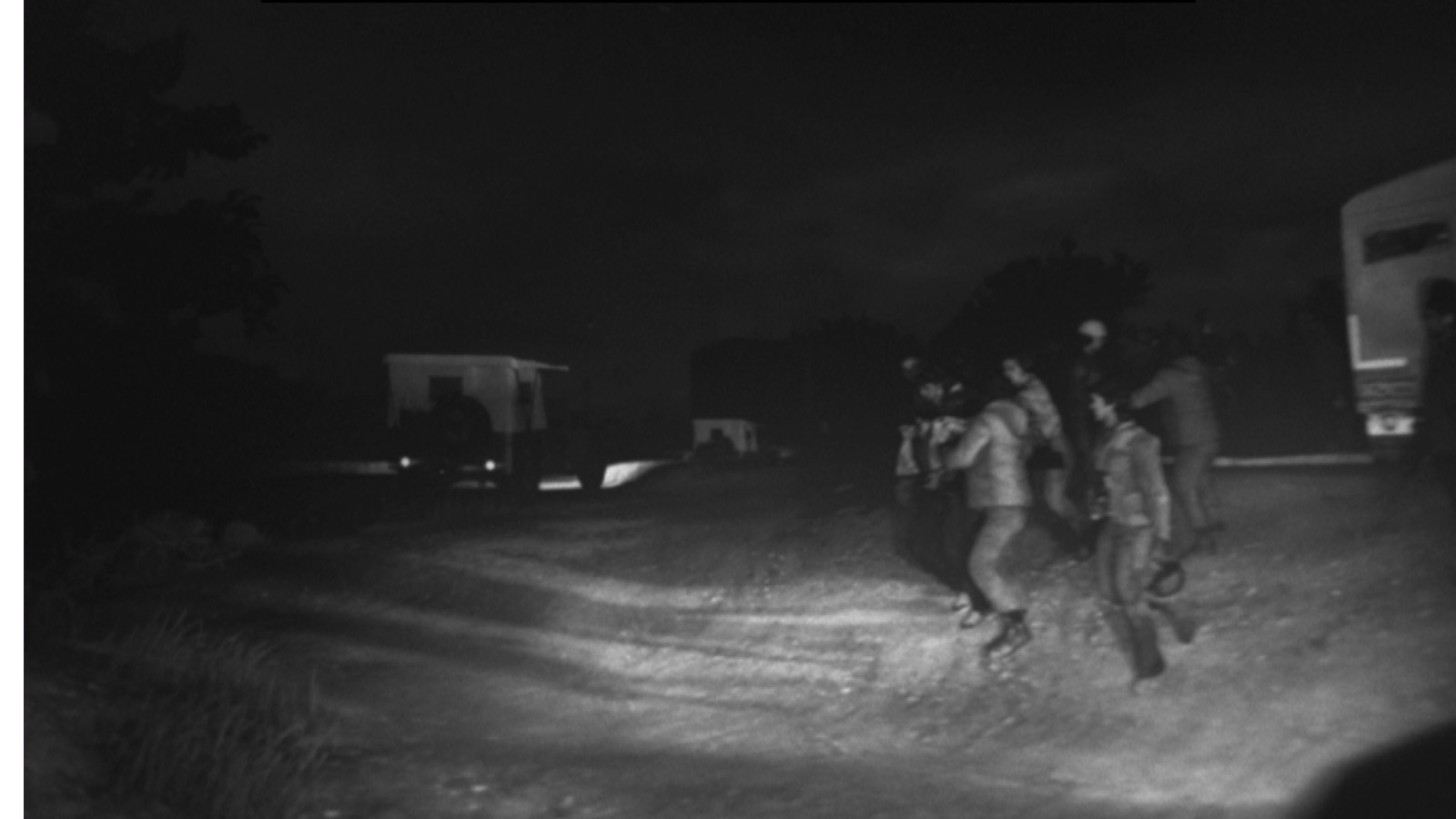Charged with overseeing Israel’s war on terror-both Palestinian and Jewish- the head of the Shin Bet, Israel’s secret service is present at the crossroad of every decision made. For the first time ever six former heads of the agency agreed to share their insights and reflect publicly on their actions and decisions. The Gatekeepers offers an exclusive account of the sum of their success and failures. It validates the reasons that each man individually and the six as a group came to reconsider their hard-line positions and advocate a conciliatory approach toward their enemies based on a two-state solution.
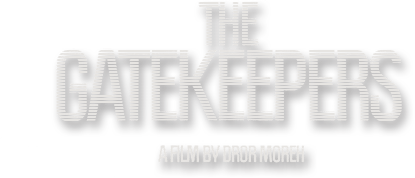
About the film


Director’s note
In The Gatekeepers, I go to the heads of the Shin Bet, the people with the power to shape history from behind the scenes. Living in the shadows, they have never spoken about their work in front of a camera before.
The idea to do this movie came to me while I was working on my previous film, Sharon. From my discussions with the prime minister’s innermost circle of advisors, I learned how the critique of some of these Gatekeepers influenced Sharon’s decision to disengage from Gaza.
I went to each of the Gatekeepers and asked them to tell me their life stories. I wanted them to share their unique perspective on the Arab-Israeli conflict. I was startled, but also thrilled, when they agreed. This gave me an unprecedented, intimate opportunity to enter the inner sanctum of the people who have steered Israel’s decision-making process for almost half a century.
The Gatekeepers were generous with their time and information. Some were better storytellers than others, but they each had a story to tell in their own distinct voices. They were there at all the most important junctions in the history of the State of Israel since the Six Day War.
Day after day, while interviewing them, I found myself staring in disbelief at these anonymous soldiers. Their stories and testimonies were often overwhelming. I couldn’t help but ask asking myself how far I would have gone if confronted with the same life-or-death dilemmas that they dealt with on a day-to-day basis. I still do.
No one understands the conflict between Israel and the Palestinians better than these six men. When they speak, leaders listen. Perhaps the time has come for the Gatekeepers to address the people at large, and not just the inner circles of decision-makers.
I hope this film initiates that dialogue.
— Dror Moreh



The Director
Dror Moreh began his career as a director of photography and became one of Israel’s leading cinematographers. He shot a number of feature films, including:
- Urban Feel (Berlin official competition, 1998).
- Desperado Square (Winner of the Best Film Award at the Montpelier Film Festival).
- and many more…
Moreh has also worked as a D.O.P for many award-winning documentaries in Israel, including One Shot, Asesino, and Underdog: A War Movie.
Moreh began working as fulltime director several years ago. In addition to The Gatekeepers, his projects include:
- The Rose: A 6-part documentary series about the murder of a young girl.
- To Be Mayumana: A documentary film portraying an Israeli dance group heading to New York for their world premiere.
- Under Cover: A 4-part docudrama about undercover police officers.
- Sharon: A feature-length documentary about the reasons why Prime Minister Ariel Sharon, considered the “Father of Israeli settlements in the Occupied Territories,” agreed to implement the Gaza Disengagement Plan. The film was selected for the official Panorama program at the 58th Berlin Film Festival.
- Occupational Hazard: A documentary film portraying an Israeli journalist’s journey into Iraq during the Second Gulf War.
- Caesarea From the Dream to Reality: An animated short on the history of Caesarea.
The Producer
Philippa Kowarsky (Producer) graduated with an M.A. in Communication Policy Studies at City University of London. She has worked in the Film and Television industry since 1993 in various capacities, including production, development, and sales.
In 1997, Philippa established Cinephil, a sales and co-productions company that is home to numerous independent international productions. Recent films distributed by Cinephil include Maori Boy Genius by Pietra Brettkelly; One Day after Peace by Miri Laufer and Erez Laufer; Love Free or Die by Macky Alston; Six Million and One by David Fischer; Cinema Jenin by Marcus Vetter; Hitler’s Children by Chanoch Zeevi; My Sweet Canary by Roy Sher; Epilogue by Manno Lanssens; Somewhere Between by Linda Goldstein; Precious Life by Shlomi Eldar; A Film Unfinished by Yael Hersonski; Budrus by Julia Bacha; Thieves by Law by Alexander Gentelev; and Women of Hamas by Suha Arraf.
Cinephil has also co-produced feature films, and distributed them and other features internationally. These include: Sweet Mud, by Dror Shaul (Winner of the Grand Jury Prize at the 2007 Sundance Film Festival, the Crystal Bear at the 2007 Berlin Film Festival, the Audience Award at the Miami Film Festival, and Israeli Academy Award for Best Film 2007) and Someone to Run With, directed by Oded Davidoff, based on the novel by David Grossman.
Current films in production at Cinephil include Cathedrals of Culture, a 3D TV series about the souls of prominent architectural masterpieces. With internationally acclaimed director Wim Wenders serving as executive producer; Putin’s Olympics, by Alexander Gentelev; Miss World, by Cecilia Peck; The October War, by Amit Goren and An Inside Joke: How Humor Invented the Jews, by Jamie Kastner.
In 2010, together with Alesia Weston, then Associate Director of the Feature Film Program International at the Sundance Institute, the Israeli Film Fund, and the Rabinovich Foundation for the Arts Cinema Project, Philippa Kowarsky co-initiated and formed a screenwriters’ lab for select Israeli filmmakers.
Philippa has taught Media at Israel’s Open University and at the Management College in Tel Aviv.


Ami Ayalon 1996-2000
Ami Ayalon was an outsider, brought to rehabilitate the Shin Bet in the aftermath of its most dismal failure—its inability to protect Prime Minister Rabin from an assassin’s bullet. As a young boy, Ayalon was raised on a kibbutz, where he excelled in soccer, even though he was thought to be “too short.” Friends sometimes say that because he was so short he felt a need to overcompensate by being in top physical shape.
Unlike his predecessors, Ayalon came to the Shin Bet directly from the military, where he was a decorated officer. As a young commando in 1969, he received the IDF’s highest honor, the Medal of Valor, for his role in the fabled Green Island Raid against an Egyptian military instillation. Though he was severely wounded in the assault, he returned to his Naval Commando unit and eventually became its commander. During the late 1970s and early 1980s he personally led teams of divers in numerous raids against Palestinian installations along the Lebanese coast. In 1992 Ayalon was made head of the Navy, with the rank of Major General.
The Shin Bet’s reputation was in shambles following the Rabin assassination, so Prime Minister Peres decided to bring in an outsider to help restore public confidence. Ayalon was his top choice for the position. Not only was he a beloved war hero; he was also a resilient and stubborn commander, with a reputation for being a straight-shooter. Forthright and even sharp-tongued, he would “tell it like it is,” regardless of whether he was addressing his subordinates or his superiors. Most of all he was a hard-edged veteran of Israel’s elite Naval Commandos.
Ayalon’s main goal as Head of Shin Bet was to increase security around the country’s leadership. Until Rabin’s assassination, Israel had been a very open society with relatively free access to politicians among all sectors of the population. An assassin’s bullet changed all that. The country’s leaders suddenly became targets and required layer upon layer of protection. Ayalon was charged with implementing this.
During Ayalon’s five-year tenure, he waged a relentless war against terror under three very different prime ministers: Shimon Peres, Benjamin Netanyahu, and Ehud Barak. Yet though he is considered to be the most left-wing head of the Shin Bet, it was actually Labor Prime Minister Ehud Barak for whom he reserved his sharpest criticism. When the Camp David talks collapsed in 2000, conventional wisdom assumed that Barak had offered Arafat everything, and that it was only the Palestinian leader’s intransigence that prevented them from reaching a peace treaty. Ayalon shattered this myth, claiming that Barak had arrived unprepared and hectored Arafat, instead of negotiating with him. Ayalon also claims that the Intifada was not planned by Arafat. He believes it was a popular eruption of longstanding frustration among the Palestinians.
Avi Ditcher 2000-2005
Avi Dichter is a chameleon, who is just as comfortable in Palestinian society as he is in Israeli society. Upon completing his military service in Sayeret Matkal, Israel’s legendary commando unit, Dichter joined the Shin Bet and was stationed in its Southern Command, responsible for the volatile Gaza Strip. By 1992 he was head of the Southern Command, overseeing some of the Shin Bet’s most brazen operations, including the assassination of “The Engineer” in 1995. He served for a short time as head of the Shin Bet’s Security Desk, following the assassination of Yitzchak Rabin. In May 2000 his former commander in Sayeret Matkal, now Prime Minister Ehud Barak, promoted Dichter to the position of Head of the Shin Bet, succeeding Ami Ayalon. Shortly afterward the country erupted in the bloody al-Aqsa Intifada.
Dichter’s military training served him well. Convinced of the justice of his cause, he could be cold and ruthless, but as someone who was comfortable mingling with the Arab population he also appreciated the value of HUMINT (human sources of intelligence). He was successful under Barak and flourished under Ariel Sharon, when the latter became prime minister. Both he and Sharon were pragmatists, and Dichter was never forced to justify his preferred strategies, no matter how diplomatic-or how forceful–they might be. This leeway was invaluable, given the extreme violence of the Second Intifada. Although Israel suffered many casualties, it was spared many more because of Dichter and the vast array of techniques he employed to combat terrorists and stem terrorism.
Perhaps the most controversial of these was his policy of targeted assassinations. Modeled largely after the successful attack on Yahya Ayyash, these increased in number under Dichter, with the full support of the Sharon government. At the same time Dichter expanded the role of intelligence gathering to preempt attacks and was one of the initiators of the Separation Wall, believing that it would hinder terrorists from reaching their targets in Israel.
Avraham Shalom 1980-1986
Avraham Shalom began his military career before the State of Israel was founded. He fought in the Palmach, the pre-state underground paramilitary group that formed the basis of the IDF, and then moved to the Shin Bet just as it was being founded. In 1959-1960, he was part of the team of Mossad and Shin Bet operatives that tracked and kidnapped an Argentine citizen, Ricardo Klement, better known as Adolf Eichmann, and brought him to justice in Israel. Following the massacre of Israeli athletes at the 1972 Munich Olympics, Shalom was appointed head of the Shin Bet’s Security Desk. In 1980, he became Head of the Shin Bet.
Shalom’s turbulent tenure was rocked by terrorism from Palestinians and, increasingly, from fundamentalist Jews who opposed all concessions in the country’s quest for peace. A “Jewish Underground” composed of radical West Bank settlers opened fire on the Islamic College of Hebron, killing three students, and planted bombs in the cars of leading Palestinian officials, permanently maiming the mayors of Ramallah and Nablus. When Shalom eventually caught the “Underground,” he uncovered a plot to blow up the Dome of the Rock, an act which would have unleashed the fury of the entire Arab world against the State of Israel.
By the early 1980s, Shalom was one of the most influential security figures in Israel, though this eventually led to his downfall. In 1984 he ordered the summary execution of two terrorists captured alive after hijacking the 300 bus from Tel Aviv to Ashkelon. A front page newspaper photo of one of those terrorists being taken off the bus in handcuffs led to an official investigation. Shalom remained taciturn throughout, and refused to divulge the full story of what happened, even after senior Shin Bet officials resigned in protest. According to Shalom, the incident was handled with the full consent of the highest levels of government. Prime ministers Yizhak Shamir and Shimon Peres supported Shalom, but the public outcry eventually forced his resignation in 1986.
Carmi Gillon 1994-1996
Carmi Gillon, who succeeded Peri as Head of the Shin Bet, comes from an aristocratic Israeli family. His grandfather was the only Jewish justice to serve on the Supreme Court of the British Mandate of Palestine, his father was a State Attorney, and his mother was Deputy Attorney General. Nevertheless, he was also one of the people least prepared to head the Shin Bet, and his brief tenure was marked by its greatest debacle–its failure to protect Prime Minister Rabin from an assassin’s bullet.
Carmi served in Israel’s Armored and Artillery corps before sustaining an injury in the War of Attrition. Upon completing his service, he studied Political Science at The Hebrew University. It was there that he was first recruited by the Shin Bet. He spent the first part of his service working for its Security Desk, charged with protecting Israeli installations overseas, including embassies, El Al offices, and other facilities. In 1982 he was appointed head of the Jewish Desk, and was involved with the capture of the Jewish Underground and of Yonah Avrushmi, who threw a grenade at a Peace Now demonstration in Jerusalem in 1983. At the time it was the most serious attack by Jews against Jews in modern Israel’s history.
Gillon left this position in 1987 to study at the National Security College. Upon graduating, he assumed several senior positions in the Shin Bet, while simultaneously studying for an MA in Political Science and Public Administration. He later served as head of the Shin Bet’s Northern Command, overseeing operations in Lebanon.
In March 1994, Gillon was handpicked by Yaakov Peri to succeed him. During his brief tenure, he shifted the organization’s focus to Jewish terrorism, especially from the right. This new direction posed a serious challenge to Gillon. It required him to conduct surveillance on Israelis who had never committed a crime, but whom he suspected of preparing to launch the most severe attacks against the state and its leaders. Exacerbating the problem was the fact that these people, mostly idealistic settlers with extensive military training, had the support of many prominent politicians.
Despite numerous successes in the war against Jewish terrorism, this was also where Gillon confronted his greatest failure. He had long warned that extremists would attempt to kill Prime Minister Rabin in order to hinder the peace process, but Israel had never faced political assassinations before, and most people were skeptical of his assessments. They were wrong. On 4 November 1995, an assassin managed to slip through the “sterile area” surrounding the prime minister and shoot him from close range. Gillon immediately took responsibility for the fiasco and handed in his resignation, but this was rejected by acting Prime Minister Shimon Peres.
Ironically, this enormous failure was followed by one of Gillon’s greatest successes. In January 2006, the Shin Bet assassinated “The Engineer,” Yahya Ayyash, a Palestinian terrorist who had masterminded some of the bloodiest attacks on Israeli civilians in recent memory.
The following day Gillon resigned, still overwhelmed by the aftershocks of the Rabin assassination.
Yaakov Peri 1988-1995
Yaakov Peri would have fit right in to a John Le Carre´ novel as a foil to the enigmatic Smiley. Suave, debonair, a true ladies’ man, he could have easily followed a career in music and, in fact, he played trumpet for Jerusalem’s Voice of Israel Orchestra.
Born in Tel Aviv in 1944, Peri entered the Hebrew University upon his release from the IDF. He completed his studies at Tel Aviv University with a joint degree in Middle Eastern Studies and Jewish History. He was recruited by the Shin Bet in 1966, and was trained as a field officer in the Arab sector. In 1987, following the 300 bus incident, he was appointed deputy director of the Shin Bet, and the following year Prime Minister Yitzchak Shamir selected him as its head.
The crisis facing the Shin Bet at the time was how to cope with the Intifada, an unprecedented mass uprising in the Occupied Territories. Peri, who had spent years studying and working in the Arab sector, was instrumental in setting up a vast network of informers and collaborators in the early years of Israel’s occupation. Yet despite all this, the sudden eruption of the Intifada came as a complete surprise to him and other senior members of the Shin Bet.
During his tenure, allegations were made about “exceptional practices” at the Shin Bet’s Gaza City interrogation facility. Though an official investigation acquitted Peri, the agents who ran the facility claimed that they had been hung out to dry in order to avoid another public scandal so soon after the 300 bus incident.
Peri left the Shin Bet in 1994. During his six years in office he instituted the conceptual changes necessary to deal with a new political reality in the Middle East, in the wake of the Intifada and Oslo Accords. As a confidante of Prime Minister Yitzchak Rabin, he took part in the delegation that negotiated security agreements with the Palestinians. Despite his position as a spymaster, no one questioned his integrity or fairness.
Yuval Diskin 2005-2011
Yuval Diskin still has vivid memories of the 1967 Six Day War, even though he was just a young boy at the time. As a young man he served in the IDF’s Shaked Reconnaissance Unit, rising to the rank of Deputy Company Commander.
He joined the Shin Bet in May 1978 and was appointed Coordinator for the Nablus District. There, in the alleys of the refugee camps, he learned about the harsh realities of the Israeli- Palestinian conflict. During Operation Peace for Galilee he served in Beirut (1982) and Sidon (1983). In August 1990, he was appointed Director of the Department for Counter-Terrorism and Counter-Espionage at the Arab and Iranian Affairs Desk.
Diskin’s attitudes to the conflict changed even before the signing of the Oslo Accords, as a result of his participation in security talks with the Palestinians. From 1993 to 1997, he was deeply involved in establishing clandestine links with the leaders of the Palestinian security services, as well as with Jordanian and Egyptian intelligence.
In May 1997, he was appointed Director of the Central Command of the Shin Bet (Jerusalem and West Bank Region), a position he held until June 2000. During these turbulent years, the military wing of Hamas carried out a string of suicide attacks intended to foil the peace process. Diskin headed the operation that destroyed Hamas military infrastructures throughout Judea and Samaria. In July 2000, he was appointed Deputy Director of the Shin Bet. He became Head of the Shin Bet in May 2005.
While serving as Deputy Director of the Shin Bet, he worked with his counterparts in the IDF to create an integrated counter-terrorism doctrine to thwart terrorist attacks, particularly the suicide bombers known as “ticking time bombs.” He is believed to be the person who initiated and perfected the doctrine of “targeted assassination.”
Upon retiring from the Shin Bet in May 2011, he has drawn attention from the Israeli and international media for his sharp critique of the current government’s policies toward the Palestinians.


-
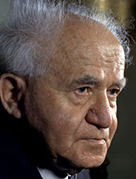
Prime Minister
David Ben-Gurion
Events- 1948Zionist statesman and first prime minister. He declared Israel’s independence on May 14, 1948, and led the country through the War of Independence, the creation of its security forces, and the mass immigration of Jews from around the world.
-
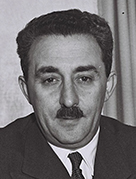
Prime Minister
Moshe Sharett
Events- As prime minister and foreign minister, he presided over continued socioeconomic development, while absorbing the waves of new immigrants.
-

Prime Minister
David Ben-Gurion
Events- 1956Supported the establishment of relations with West Germany, despite bitter opposition. He also led the country during the 1956 Sinai campaign, in which Israeli forces temporarily secured the Sinai Peninsula. During his term of office, Adolf Eichmann was captured, tried, and executed for his role in the murder of six million Jews.
- 1963In June 1963 Ben-Gurion resigned as Prime Minister, citing “personal reasons.”
-

Prime Minister
Levi Eshkol
Events- 1967The high point of his premiership was the Six Day War of June 1967, in which Israel retook the Sinai Peninsula, occupied the West Bank, Gaza, and the Golan Heights, reuniting Jerusalem as the nation’s de facto capital.
- 1969Eshkol died in office on February 26, 1969.
-
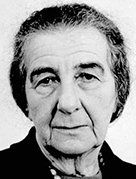
Prime Minister
Golda Meir
Events- 1973The world's third female prime minister, she led the country through a surprise, coordinated assault by Egypt and Syria, which broke out on Yom Kippur, the most solemn day in the Jewish calendar, October 6, 1973.
- 1974Though she and the Labor Party won the elections (postponed due to the war until December 31, 1973), she resigned in 1974 in favor of Yitzhak Rabin.
-
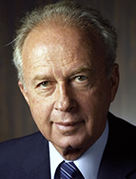
Prime Minister
Yitzhak Rabin
Events- 1975Placed a special emphasis on improving the economy, solving social problems, and strengthening the Israel Defense Forces (Israel's military, abbreviated as IDF). With American mediation, Rabin concluded the interim agreement with Egypt in 1975.
- TAs a result of this agreement, the first Memorandum of Understanding was signed between the Government of Israel and the United States.
- On 4 July 1976, the Rabin government ordered the Entebbe Operation.
-
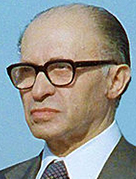
Prime Minister
Menachem Begin
EventsShin Bet Leader
Avraham Shalom
- 1979Helped initiate the peace process with Egypt, which resulted in the Camp David Accords, (witnessed by U.S. President Carter) and the 1979 Israel-Egypt Peace Treaty, and Israel's withdrawal from Sinai. In 1981, Begin ordered the Israeli Air Force to bomb the Osirak nuclear reactor in Iraq, where the Iraqi regime was developing nuclear weapons.
- 1982In 1982, after repeated attacks against Israeli targets at home and abroad, Israel launched Operation Peace for Galilee to remove enemy rockets from Israel's northern border.
- 1983Begin's decision to encourage Ethiopian Jews to immigrate to Israel later culminated in Operation Moses, which brought thousands en masse to Israel in the early 1980s. In October 1983 Begin resigned as prime minister.
-
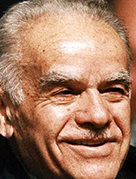
Prime Minister
Yitzhak Shamir
EventsShin Bet Leader
Avraham Shalom
- 1984Shamir succeeded Menachem Begin as prime minister and led the Likud Party to a stalemate with Labor in the 1984 elections. In a power-sharing agreement with Shimon Peres, Shamir became vice premier and foreign minister in the Government of National Unity.
-

Prime Minister
Shimon Peres
EventsShin Bet Leader
Avraham Shalom
- After proposing the establishment of a National Unity Government, Peres's first term as prime minister was through a rotation arrangement with Likud leader Yitzhak Shamir.
-

Prime Minister
Yitzhak Shamir
EventsShin Bet Leader
Avraham Shalom
- 1989During his tenure, the Palestinians of the West Bank and Gaza launched a popular uprising (Intifada) against the Israeli Occupation. In response, in 1989, Israel proposed a Four-point Peace Initiative with the Palestinians.
- The collapse of the Soviet Union resulted in a mass immigration of Jews.
- 1991In 1991, Israel was attacked by Iraqi Scud missiles during the First Gulf War.
- A new Middle East peace conference was convened in Madrid, and the remaining Jews of Ethiopia were airlifted to Israel in Operation Solomon.
-
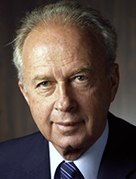
Prime Minister
Yitzhak Rabin
EventsShin Bet Leader
Yaakov Peri
- 1993On September 13, 1993, Rabin and PLO Chairman Yasser Arafat signed the Oslo Accords in Washington, D.C. in the presence of U.S. President Bill Clinton, outlining the proposed interim self-government arrangements for the Palestinians. The "Gaza and Jericho First" agreement, signed in Cairo on May 4, 1994, addressed the implementation of the first stage of this Declaration of Principles.
- 1994In recognition of progress in the negotiation with the Palestinians, Rabin received the 1994 Nobel Peace Prize, together with Israeli Foreign Minister Shimon Peres and PLO Chairman Yasser Arafat. On October 26, 1994, Rabin and King Hussein signed the Israel-Jordan peace treaty.
- 1995On November 4, 1995 Rabin was assassinated by a Jewish extremist.
-

Prime Minister
Shimon Peres
EventsShin Bet Leader
Carmi Gillon
- Peres assumed the positions of prime minister and minister of defense following the Rabin assassination and served in this capacity for seven months, until the May 1996 elections. During this trying period, Peres strove to maintain the momentum of the peace process, despite a wave of terrorist attacks by Palestinian suicide bombers against Israeli civilians.
-

Prime Minister
Benjamin Netanyahu
EventsShin Bet Leader
Ami Ayalon
- 1996In 1996, in the first direct elections of an Israeli prime minister, Benjamin Netanyahu defeated incumbent Labor candidate Shimon Peres and became the ninth prime minister of the State of Israel.
- 1997In 1997, Israel and the PLO signed the Hebron Protocol and in 1998 they signed the Wye River Memorandum to facilitate implementation of the Interim Agreement.
-
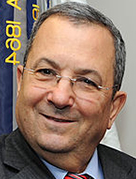
Prime Minister
Ehud Barak
EventsShin Bet Leader
Ami Ayalon
- Barak sparked controversy by deciding to form a coalition with the ultra-Orthodox Shas party.
- In consequence, the leftwing Meretz party quit the coalition after they failed to agree on the powers to be given to a Shas deputy minister in the Ministryof Education.
- 1999In 1999, Barak gave a campaign promise to end Israel's 22-year long occupation of Southern Lebanon within a year. On May 24, 2000 Israel withdrew from Southern Lebanon. Barak took part in the failed Camp David 2000 Summit, hosted by U.S. President Bill Clinton, which was meant to resolve the Israeli-Palestinian conflict Toward the end of his term, the Occupied Territories erupted again in a "Second Intifada."
-
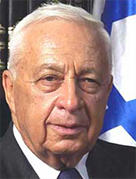
Prime Minister
Ariel Sharon
EventsShin Bet Leader
Avi Dichter
- 2003After calling early elections to the 16th Knesset, which were held on January 28, 2003, Ariel Sharon was charged by the president with the task of forming a new government. He presented a Disengagement Plan to the Knesset, by which Israel would withdraw its troops and settlers from the Gaza Strip and dismantle all settlements there, as well as four settlements in the northern West Bank.
- 2005Between August 16 and August 30, 2005, Israel safely evacuated about 8,500 Israeli settlers and, on September 11, 2005, Israeli soldiers left Gaza, ending Israel's 38-year presence in the area. The implementation of the Disengagement Plan was viewed as a success by most of the Israeli public, although it sparked bitter protests from ministers of Sharon's Likud Party, causing a party schism.
- Facing bitter infighting in the Likud, Sharon formally resigned from the party to form a new centrist party, "Kadima," or "Forward" on November 21, 2005.
-
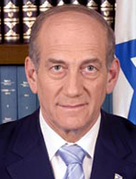
Prime Minister
Ehud Olmert
EventsShin Bet Leader
Yuval Diskin
- 2006Stepping in to replace Sharon, Olmert's term began with a Hamas victory in the Palestinian parliamentary elections of January 25, 2006.
- 2006On July 12, 2006, Hezbollah terrorists infiltrated Israeli territory on the border with Lebanon, attacked an Israel Defense Forces patrol and kidnapped two soldiers. Olmert immediately ordered artillery fire and air strikes inside Lebanese territory, sending ground troops over the border a week later to officially launch the Second Lebanon War.
- 2007On May 2, 2007, the Winograd Commission, established to review the Second Lebanon War, accused Olmert of failing to properly manage the war, which prompted a mass rally of over 100,000 Israelis calling for his resignation.
- 2007In November 2007, Olmert accepted President Bush's invitation to the Annapolis Peace Conference, where he declared Israel's intention to continue negotiations with the Palestinians about all issues, including the repatriation of Palestinian refugees. After the conference little real progress was made in the peace process.
- 2008In July 2008, Olmert announced his intention to resign from his post following the next general election, in response to charges of corruption and bribery that had been brought against him.
-

Prime Minister
Benjamin Netanyahu
EventsShin Bet Leader
Yuval Diskin
- 2009In February 2009, following the elections to the 18th Knesset, Benjamin Netanyahu was charged with forming the next government. Though his party won the second most seats in the election, it was believed to have the best chance of building a coalition government.
“One Of The Best Films Of The Year”
- NEW YORK MAGAZINE, David Edelstein
- NATIONAL PUBLIC RADIO, Bob Mondello
- NEW YORKER, David Denby
- WALL STREET JOURNAL, Joe Morgenstern
- THE LOS ANGELES TIMES, Kenneth Turan
- ENTERTAINMENT WEEKLY, Lisa Schwarzbaum
- THE NEW YORK TIMES, Manohla Dargis
- CHRISTIAN SCIENCE MONITOR, Peter Rainer
- THE HOLLYWOOD REPORTER, Todd McCarthy
Reviews
- “With this [Top Ten] pick I'm breaking a self-imposed rule about excluding films that are up for an Oscar, by virtue of a brief qualifying run, but haven't yet gone into commercial release. No matter. Rules go out the window when it comes to something as momentous as Dror Moreh's documentary, which brings together all the surviving directors of Shin Bet, Israel's internal security agency. What these tough and tough-minded men have to say about Israeli politicians, and the nation's current stance vis à vis its enemies, is stunning and edifying in equal measure.”
— Joe Morgenstern, THE WALL STREET JOURNAL
- “A documentary potent enough to alter how you see the world…To call the blisteringly candid results eye-opening is not even to scratch the surface…Riveting from beginning to end… The autobiography of a country, if you will, told by ultimate insiders.”
— Kenneth Turan, THE LOS ANGELES TIMES
- “Mr. Moreh's amazing, upsetting film…It is hard to imagine a movie about the Middle East that could be more timely, more painfully urgent, more challenging to conventional wisdom on all sides of the conflict…. It is guaranteed to trouble any one, left, right, center or head in the sand, with confidence or certainty in his or her own opinions.”
— A.O. Scott, THE NEW YORK TIMES
